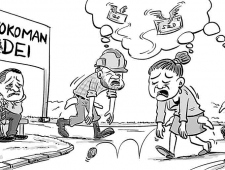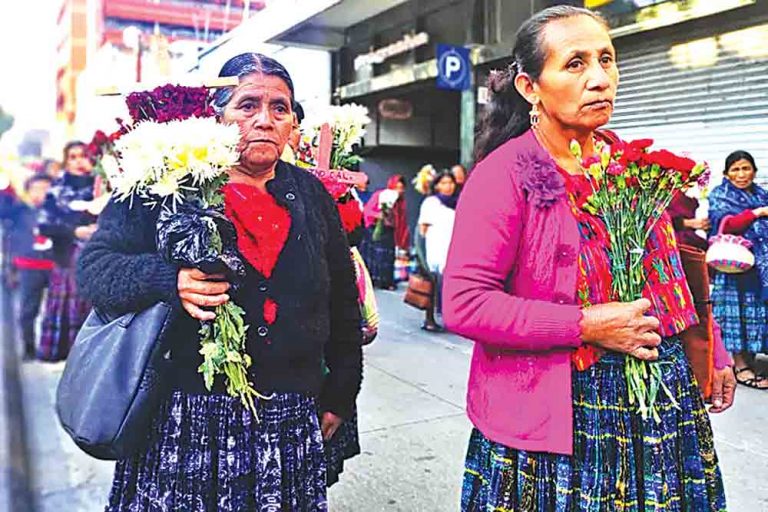
advertentie
Nieuws Archief
Social media

GUATEMALA – Jesus Tecu remembers wrapping his little brother in his arms in an attempt to protect the two-year-old from the horrors unfolding around them.
It was March 13, 1982, and their village of Rio Negro — a Maya Achi community situated along a river in central Guatemala — was under attack. Guatemala was in the midst of a grisly civil war, and army and paramilitary forces had been stalking the countryside, razing Indigenous villages to the ground.
Already, Tecu’s parents had been among the dozens of Rio Negro residents slaughtered just one month prior in another village. But now soldiers and paramilitary patrolmen were in the town, and 10-year-old Tecu hoped to shield his brother from the killings and rapes they were witnessing.
A patrolman decided to take Tecu to be his household servant, but he did not want to bring home a toddler too. Ignoring Tecu’s desperate pleas, the patrolman grabbed the two-year-old from his arms, smashed him against rocks and threw his body into a ravine.
An estimated 107 children and 70 women died in Rio Negro that day. Tecu and 16 other children survived only because they were chosen to be servants.
Now, Tecu hopes a criminal case in Guatemala can offer a shred of accountability for atrocities thousands of Indigenous people experienced during that period.
“We have never stopped seeking justice,” said Tecu, who has spent the last 30 years as a human rights activist and advocate for community rebuilding.
Yesterday, Manuel Benedicto Lucas Garcia, the former head of Guatemala’s army, is slated to stand trial for genocide. It is the latest chapter in the country’s fitful, stop-and-start efforts to achieve justice for the systematic killing of Guatemala’s Indigenous peoples.
An estimated 200,000 people were killed during the war, which stretched from 1960 to 1996. More than 80 percent were Indigenous Maya.
A United Nations-backed truth commission found that the military committed acts of genocide against five of the country’s 22 different Maya peoples between 1981 and 1983. That period overlaps with Lucas Garcia’s tenure as the chief of the general staff of the army.
For seven months between 1981 and 1982, Lucas Garcia helmed Guatemala’s forces, as part of the administration of President Romeo Lucas Garcia, his brother. He now stands accused of genocide, crimes against humanity, forced disappearances and sexual violence.
But Tecu points out that time is running out for survivors to find justice. Decades have passed since the war’s end. Alleged perpetrators like Lucas Garcia, 91, are growing old — and in many cases, dying.
“The importance of this case is that there is an intellectual author alive,” Tecu told Al Jazeera. “He needs to be held accountable for what happened with the deaths of so many children, women and men.”
Lucas Garcia, however, has denied wrongdoing. Rather, in a live video feed on March 25, he told Guatemala’s High Risk Court A: “I am a national hero”, though he later clarified he meant it in reference to accomplishments unrelated to the armed conflict.
The March 25 hearing came after a year of postponements. Expecting the trial to start, genocide survivors had gathered outside the courthouse in Guatemala City to hold a ceremony in support of the proceedings.
But one of Lucas Garcia’s two lawyers had announced her resignation just days ahead of the hearing, and then the other quit too — something critics believe was a tactic to further delay the trial.
Ultimately, Lucas Garcia accepted to use a public defender and was permitted to continue to attend hearings by video conference while recovering from surgery. The trial’s start date was rescheduled for April 5, to give the new lawyer time to prepare.
“We know these are all manoeuvres and strategies that Benedicto Lucas Garcia is using,” said Diego Ceto, a Maya Ixil leader providing support for witnesses and survivors during the trial.
Speaking to Al Jazeera on the courthouse steps right after the postponement, Ceto explained that other defendants have likewise used stalling techniques to evade justice.
After all, one of Lucas Garcia’s co-defendants — a former head of military operations — died in 2020. And in January, another — a former head of military intelligence — was found mentally unfit to stand trial and will face separate proceedings.
“They look for any justification to avoid the start of the trial,” Ceto said. “Nevertheless, as Ixils we will continue to insist on the pursuit of the truth.” (Al Jazeera)…[+]